Related Research Articles
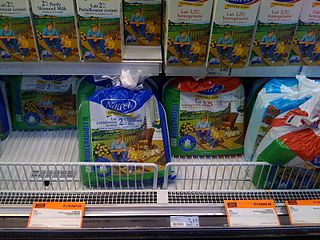
The Canadian Dairy Commission (CDC) is an Ottawa-based Government of Canada Crown Corporation that provides a framework for managing Canada's dairy industry.
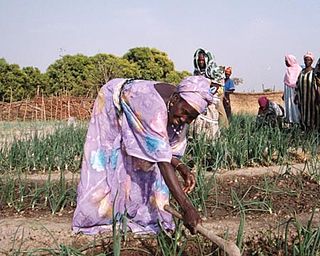
An agricultural cooperative, also known as a farmers' co-op, is a producer cooperative in which farmers pool their resources in certain areas of activities.
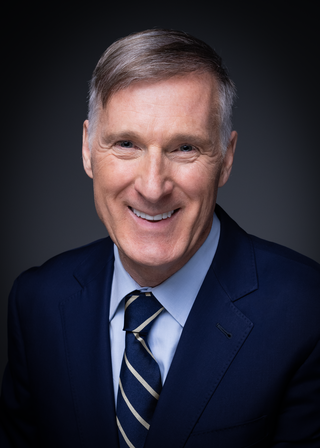
Maxime Bernier is a Canadian politician who is the founder and leader of the People's Party of Canada (PPC). Formerly a member of the Conservative Party, Bernier left the caucus in 2018 to form the PPC. He was the member of Parliament (MP) for Beauce from 2006 to 2019 and served as a Cabinet minister in the Harper government.
The International Federation of Agricultural Producers (IFAP), was an organization that advocated on the international level for member farm organizations. Established in 1946, the organization was liquidated by the French Tribunal de grande instance de Paris in a judgement made on 4 November 2010, to proceed with the liquidation of IFAP after an economic and political crisis. The Federation had gone through severe financial problems.
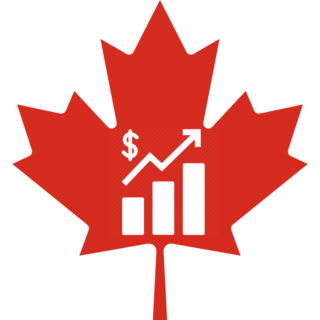
Canada is one of the largest agricultural producers and exporters in the world. As with other developed nations, the proportion of the population agriculture employed and agricultural GDP as a percentage of the national GDP fell dramatically over the 20th century, but it remains an important element of the Canadian economy. A wide range of agriculture is practised in Canada, from sprawling wheat fields of the prairies to summer produce of the Okanagan valley. In the federal government, overview of Canadian agriculture is the responsibility of the Department of Agriculture and Agri-Food.

The Canadian Agricultural Safety Association was established in 1993 in response to an identified need for a national farm safety networking and coordinating agency to address problems of illness, injuries and accidental death in farmers, their families and agricultural workers. Since then, CASA has worked to improve the health and safety conditions of those who live and work on Canadian farms.

Christmas tree production in Canada totals from 3 to 6 million trees annually. Trees are produced in many of the provinces of Canada but the nation's leading producers are found in Quebec, Nova Scotia and Ontario, which account for 80 percent of Canadian tree production. Of the 900,000 trees produced annually in British Columbia, most are cut from native pine stands.

The National Farmers Organization (NFO) is a producer movement founded in the United States in 1955, by farmers, especially younger farmers with mortgages, frustrated by too often receiving crop and produce prices that produced a living that paid less than the minimum wage, and, too often, might not even cover the cost of seed, fertilizer, land, etc. This was despite the many hours that might be devoted by an entire family. This was despite mortgages having to be paid in years of drought or hail or other crop failure. It was despite too high injury rates related to lifting and to high mortality rates due to working with heavy, sharp equipment. Frustrated farmers, thus, tried to obtain better prices. At first the methods included withholding of commodities from sale. The early methods also included opposition to those coops unwilling to withhold goods from market. During protests, farmers might purposely sell food directly to neighbors instead of through the co-ops. They might also destroy food in dramatic ways, in an attempt to gain media exposure, for example, slaughtering excess dairy cows. A 1964 incident brought negative attention when two members were crushed under the rear wheels of a cattle truck. They did not succeed in obtaining a Canadian-style quota system. Methods, thus, are different now.

The South Korean National Agricultural Cooperative Federation was established in 1961 to enhance the social and economic status of its membership and to promote a balanced development of the national economy. Its role is divided into three areas: marketing and supply, banking and insurance, and extension services.
Marie Bouillé is a Canadian politician. Bouillé was elected to represent the riding of Iberville in the National Assembly of Quebec in the 2008 provincial election. She is a member of the Parti Québécois.
The United Farmers of Quebec were founded in 1918 as part of the broader United Farmers movement in of Canada.
The Action démocratique du Québec (ADQ) party ran a full slate of 125 candidates in the 2008 provincial election and elected seven members to emerge as the third-largest party in the legislature.
Burnbrae Farms is a Canadian producer and processor of eggs, supplying grocery store chains, the food service industry, large bakeries and industrial customers. The company has farms in Ontario, Quebec and Manitoba, grading stations across the country and processing operations in Quebec, Ontario and Manitoba.
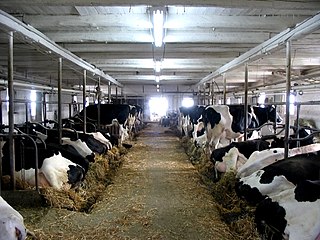
Dairy farming is one of the largest agricultural sectors in Canada. Dairy has a significant presence in all of the provinces and is one of the top two agricultural commodities in seven out of ten provinces.
Les producteurs de lait du Québec (PLQ) is an agricultural organization representing milk producers in the Canadian province of Quebec. This democratic organization, whose directions are set in the general meetings of its members, is administered by a board of directors made up of the presidents of the 14 regional boards. Affiliated with the Union des producteurs agricoles (UPA), the PLQ works to defend and promote the general interests of its members.
Dairy Farmers of Ontario (DFO), is the marketing organization and regulatory body representing over 4,000 dairy farmers in Ontario, Canada. DFO was formerly known as the Ontario Milk Marketing Board (OMMB), which was established as result of the 1965 Ontario Milk Act. On August 1, 1995, the Ontario Milk Marketing Board and the Ontario Cream Producers' Marketing Board merged to form Dairy Farmers of Ontario.
Jean-Yves Duthel is an administrator and political spokesperson in the Canadian province of Quebec.

Canada's supply management, abbreviated SM, is a national agricultural policy framework used across the country, which controls the supply of dairy, poultry and eggs through production and import controls and pricing mechanisms. The supply management system was authorized by the 1972 Farm Products Agencies Act, which established the two national agencies that oversee the system. The Agriculture and Agri-Food Canada federal department is responsible for both the Canadian Dairy Commission and its analogue for eggs, chicken and turkey products, the Farm Products Council of Canada. Five national supply management organizations, the SM-5 Organizations — Egg Farmers of Canada (EFC), Turkey Farmers of Canada (TFC), Chicken Farmers of Canada (CFC), the Canadian Hatching Egg Producers (CHEP) and the Ottawa-based Canadian Dairy Commission (CDC), a Crown corporation — in collaboration with provincial and national governing agencies, organizations and committees, administer the supply management system.

Richard Lehoux is a Canadian politician who has served as the member of Parliament (MP) for Beauce since 2019, as a member of the Conservative Party. Prior to his election to the House of Commons, Lehoux was the mayor of Saint-Elzear from 1998 to 2017 and the reeve of Nouvelle-Beauce Regional County Municipality from 2000 to 2017.
Angélique Delahaye is a French agricultural trade unionist and politician. She was the president of the Fédération nationale des producteurs de légumes from 2001 to 2012, and a member of the board of directors of the Fédération nationale des syndicats d'exploitants agricoles. She served as a Member of the European Parliament from 2014 to 2019, and was mayor of Saint-Martin-le-Beau from 2014 to 2020.
References
- ↑ Un peu d'histoire Archived July 6, 2011, at the Wayback Machine , Union des producteurs agricoles, accessed 10 October 2010.
- ↑ Grain News, 13 February 2008, accessed 10 October 2010.
- ↑ Kevin Dougherty, "'Food sovereignty' urged for Quebec; Agricultural diversification. Report encourages more specialized farms and phasing out of income insurance," Montreal Gazette, 13 February 2008, A3.
- ↑ "The UPA and OFA insist the Quebec-Ontario agricultural agreement be reproduced in the Agreement on Internal Trade," Canada NewsWire, 11 September 2009.
- ↑ Qui sommes-nous? Archived October 12, 2010, at the Wayback Machine , Union des producteurs agricoles, accessed 10 October 2010.
- ↑ Wherry, Aaron (October 5, 2010). "Why the dairy lobby is so powerful - Macleans.ca". Macleans.ca. Retrieved June 25, 2018.
- ↑ Bernier, Maxime (July 10, 2018). "Comment: How the supply management lobby influences politicsMy unsuccessful federal leadership campaign is proof the sector has outsized political influence — for now". Manitoba Co-operator. Glacier Farm Media Limited Partnership. Retrieved July 13, 2018.